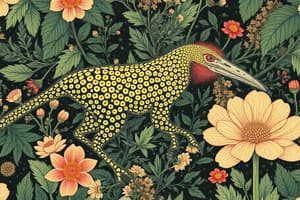Podcast
Questions and Answers
What is meant by an ecological niche?
What is meant by an ecological niche?
- A unique identifier of a species based on genetic traits.
- The physical location where a species is found.
- The interactions a species has with its prey only.
- The role played by a species within an ecosystem and its environmental conditions. (correct)
Who defined the concept of niche in 1927 and emphasized the role of species in a community?
Who defined the concept of niche in 1927 and emphasized the role of species in a community?
- Charles Elton (correct)
- David Attenborough
- G.E. Hutchinson
- Gregor Mendel
Which of the following describes a generalist species?
Which of the following describes a generalist species?
- Species that are exclusive predators and do not share habitats.
- Species that can only thrive in specific environments.
- Species able to thrive in various environmental conditions and exploit multiple resources. (correct)
- Species adapted to a narrow range of environmental conditions.
What does allopatric speciation involve?
What does allopatric speciation involve?
Which of the following factors is NOT a physical condition affecting a species' niche as proposed by G.E. Hutchinson?
Which of the following factors is NOT a physical condition affecting a species' niche as proposed by G.E. Hutchinson?
Which of the following is an example of a specialist species?
Which of the following is an example of a specialist species?
Which of the following best describes the process of speciation?
Which of the following best describes the process of speciation?
What is a key characteristic of geographic isolation?
What is a key characteristic of geographic isolation?
What characterizes sympatric speciation?
What characterizes sympatric speciation?
What is behavioral isolation?
What is behavioral isolation?
What is acclimation in terms of individual adaptations?
What is acclimation in terms of individual adaptations?
How do genetic traits contribute to adaptation?
How do genetic traits contribute to adaptation?
Which of the following best describes natural selection?
Which of the following best describes natural selection?
What factor does physiological stress refer to in the context of species limitations?
What factor does physiological stress refer to in the context of species limitations?
What is one of the primary ways species diversity is produced according to evolution?
What is one of the primary ways species diversity is produced according to evolution?
Which of the following is NOT a limiting factor of species?
Which of the following is NOT a limiting factor of species?
Study Notes
Ecological Niche
- Habitat refers to the specific environmental conditions where an organism lives.
- An ecological niche defines a species' role within an ecosystem, including its food procurement methods and interactions with other species.
- Charles Elton, a British ecologist, introduced the concept of ecological niche in 1927, emphasizing the role of species in communities and their contributions to ecological functions.
- G.E. Hutchinson, an American limnologist, expanded the niche concept by focusing on the biophysical aspects, including temperature, light, acidity, humidity, salinity, and various biological interactions.
Generalists and Specialists
- Generalist species thrive in diverse environmental conditions, exploiting a wide range of resources (e.g., rats, cockroaches, dandelions).
- Specialist species have narrow ecological niches, such as the Giant Panda and the Giant Saguaro, adapted to specific habitats and resources.
Speciation
- Speciation occurs when a subset of a species develops unique characteristics, potentially evolving into a new species.
- Adaptation to specific ecological niches can lead to specialized traits that distinguish new populations from their relatives.
- Allopatric speciation arises from geographical separation, preventing interbreeding, thereby facilitating genetic divergence.
- Sympatric speciation occurs without geographical barriers, allowing reproductive isolation due to behavioral differences, such as distinct mating calls.
Evolution and Species Diversity
- Adaptation is crucial in biology; species develop traits that enhance survival in their environments.
- Examples of adaptation include polar bears in the Arctic and saguaro cacti in deserts, showcasing specific environmental adjustments.
Adaptation Mechanisms
- Acclimation allows individuals to quickly adjust to changing environments, such as a houseplant adjusting to sunlight after winter indoors.
- Genetic traits are inherited over generations, enabling species to adapt successfully to their habitats.
Evolutionary Processes
- The theory of evolution explains how species change over generations due to resource competition.
- Natural selection favors individuals best suited to their environments, allowing them to pass advantageous traits to their offspring.
- Mutations are alterations in DNA sequences that can be inherited, contributing to species variation and adaptation.
Limiting Factors of Species
- Limiting factors regulate the population dynamics of organisms in ecosystems, affecting individual fitness and reproductive success.
- Key limiting factors include:
- Physiological stress due to unsuitable environmental conditions (e.g., moisture, temperature, nutrient levels).
- Competition with other species for resources.
- Predation, including parasitism and disease.
- Random events and chance occurrences that may impact survival.
Studying That Suits You
Use AI to generate personalized quizzes and flashcards to suit your learning preferences.
Description
Explore the fascinating concepts of ecological niches, generalists, and specialists in ecosystems. Learn about the contributions of ecologists Charles Elton and G.E. Hutchinson to our understanding of species roles and adaptations. This quiz will test your knowledge on how different species interact with their environments and the processes of speciation.




